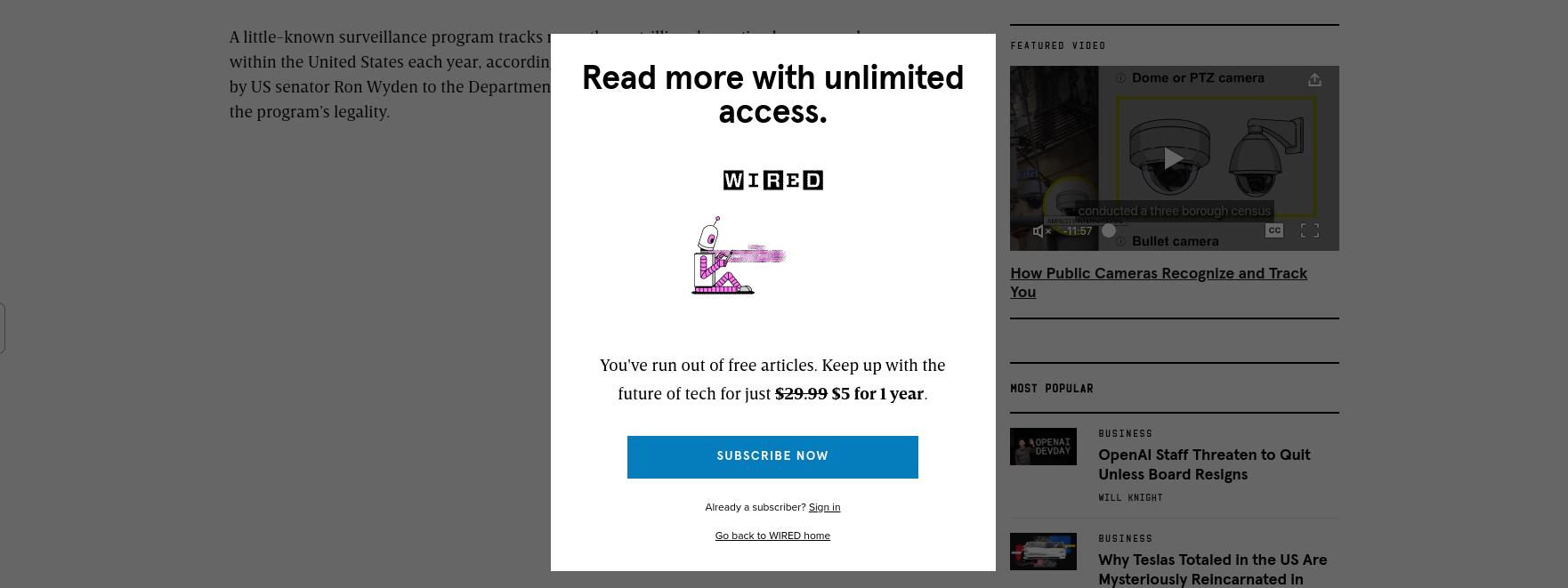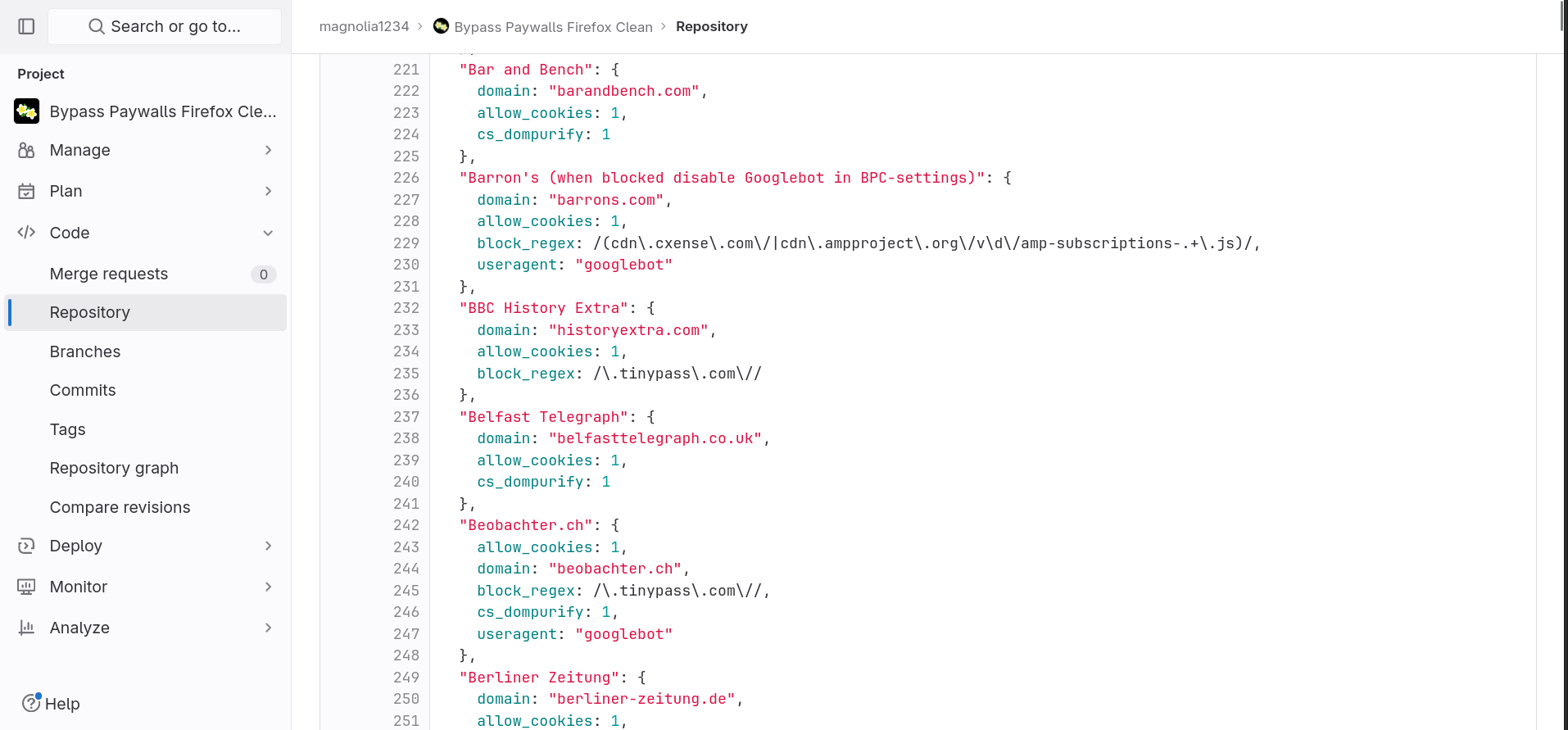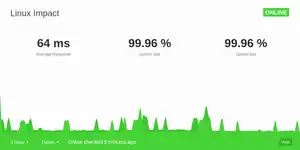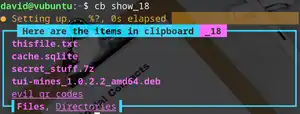
Bypass Paywalls Clean combines all soft paywall hacks into one neat package
We've all been there. You've clicked on a fascinating link, and been sucked into the witty intro. A few seconds later, usually just as you've almost made it to the end of the first sentence of the second paragraph, the text blurs, and a pop-up appears in the centre of your vision:

Yes, you've hit the soft paywall, and now your day is ruined. You'll have to stop randomly cruising from article to article or exploring a website's deep archives, and do some actual work instead.
Fortunately, there's an easy way to quickly bypass most soft paywalls.
Why do paywalls exist?

A paywall is a barrier you're not supposed to get past unless you pay - it's in the name.
The ad-funded model of financing websites isn't ideal. Readers don't like adverts, and they like being tracked around the web even less. It's not great for publishers either - they need huge amounts of traffic, and associated ad clicks to make producing content worthwhile.
One solution is for publishers to erect a hard paywall. This means that if you want to read any articles on a website, you have to have a subscription and log into the site. Nothing and no-one can get past without a subscription. There are some sites that require you to create a 'free' account to make it easier to target and track your usage.
There are a few websites that operate this way. The Times is notably one hard holdout. While publishers using hard paywalls often have a more reliable revenue stream, there are disadvantages to operating a completely solid paywall. Search engines can't access your content, which means that your SEO is shot.
Soft paywalls operate differently, and whether or not, and how they allow you to view content depends on factors such as how many articles you've viewed this month, whether you're a bot, the source of your click, and other such metrics.
Click through from the wrong source, have the wrong user agent string, or read too many gift articles? Tough shit. It's time to buy a raft of subscriptions. Unless, of course, the articles are so-called 'buyers guides', lists of tech you can buy, best-of reviews, or other such crappy content designed to shift stock through affiliate links. In this case, you can probably read as much as you want.
The kind of paywall that shows up if your browser is using an adblock, is especially disliked.
There are workarounds for soft paywalls

As soft paywalls usually kick in based on who you are, where you've come from, and what you've already read, you can fake fake some of these factors.
If you want to read a Financial Times article, for instance, you'll need to set your browser user agent to spoof as googlebot - or just go and read Google's cached version.
For other sites, you have to stop assets being loaded from certain domains or subdomains.
Of course, the simplest soft paywall relies on cookies, so it's a simple thing to right-click on links, and open them in spanky new private windows, and close the window when you're done. Some sites will even let you in if you preface the URL with "https://facebook.com/l.php?u=".
There are other hacks, and we even have a spreadsheet somewhere with a list.
But it's a chore. Yes, you want to read the articles; no, you don't want to take out another subscription while randomly link-surfing; no, you don't want to have to dig out your long list of paywall exploits.
For a long time, we used to browse the web with Lynx and images be damned, but that's become less consistently effective as paywall enforcement methods have changed.
Fortunately, there's a paywall-dodging extension that takes the hard work out of reading content for free.
Bypass Paywalls Clean does exactly what you think it does

Bypass Paywalls Clean is an extension. Actually it's a couple of extensions: Bypass Paywalls Firefox Clean, (which is for FireFox),and Bypass Paywalls Chrome Clean, which works on Chrome-based browsers such as Microsoft Edge, Opera, Vivaldi, and Yandex.
It's an ever evolving project, which is constantly updating to add new methods of outwitting paywalls, as well as growing the collection of sites with which it works.
As an extension, BPC sits between you and the site you're visiting. It rewrites the traffic as it passes through.
For some websites, it might allow in a single cookie then delete it as you cruise around indulging your curiosity; for others, it might change your user agent string. Sometimes, BPC will simply block the pop-up, and at different times and in different places, it will need to block APIs.

The point is that, yes, you could do all of this by hand, but with BPC, everything is in one place, so you won't have to.
After half an hour you won't even think about it. We installed Bypass Paywalls Clean before lunch today - just to test it out, and went to check out some previously paywalled sites. It just works. Full content, normal layout, and no need to fiddle with things, or close our normal browser (for websites with a free article limit, just click the BPC extension button then clear cookies. It's no biggie).
This is a whole new internet experience, and we've learned some new paywall-avoidance tricks just by using it, and checking out the code. We've even incorporated some into our fabulous FreshRSS instance.
Does BPC unblock every paywalled article and site?
If you're familiar with Betteridge's Law, you already know the answer to that question. No, it doesn't.
While you can use BPC to bypass hundreds of paywalls on the most popular sites, it doesn't yet cover everything. More sites are being added all the time, though, so your preferred reading material may be available some day. If you want to speed that day along, you can submit a request to have a site added.
Alternatively you can add your own sites and rules to Block Paywalls Clear through the settings menu.
Hard paywalled sites can't be bypassed either, so if you're desperate to read the latest from The Times, head to one of the archive sites instead.
Sometimes soft-paywall websites will have certain hard-paywalled articles. BPC won't help with these either.
Is Bypass Paywalls Clean safe to use?

Extensions can read all of the traffic that goes through your browser, so in theory, no extension can be guaranteed as safe under all circumstances. This is one of the reasons Google gives for degrading the capabilities of Chrome extensions.
BPC is ethically developed, and open-source - but there's no guarantee that the maintainers won't slip in some kind of malware in future, or the project won't be taken over by an evil villain intent of poisoning your machine and stealing your data
These aren't trivial concern, and it does happen to open-source projects. Extensions have also been used as trojans, viruses, keyloggers, and other such horrible things.
It's a very small risk, and no greater than that of any other browser extension, but it's one that you should take into consideration.
That Bypass Paywalls Clean isn't present in either the Mozilla add-ons store or the Google Chrome Web Store could be indicative, but we're fairly sure it's a business decision by Mozilla and Google rather than anything else. BPC is open-source, we've read through the code, and while we're not actual experts, it seems legit.
Is it ethical to bypass paywalls to access premium content?

Once again, we would refer you to Betteridge's law of headlines. But hey, we're not your parents, and we're not going to give you a list of seven different ways to bypass paywalls. We're giving you one, and its good.













